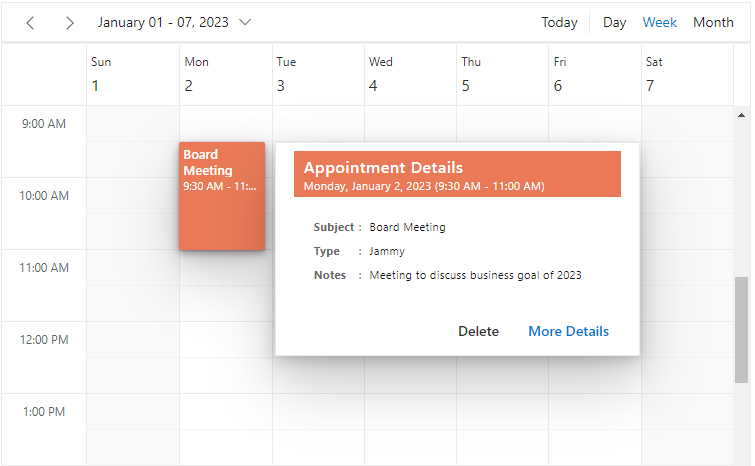
Product
Introducing Socket MCP for Claude Desktop
Add secure dependency scanning to Claude Desktop with Socket MCP, a one-click extension that keeps your coding conversations safe from malicious packages.
@syncfusion/ej2-vue-schedule
Advanced tools
Flexible scheduling library with more built-in features and enhanced customization options similar to outlook and google calendar, allowing the users to plan and manage their appointments with efficient data-binding support. for Vue
The Vue Scheduler component is an event calendar that facilitates almost all the basic Outlook and Google Calendar features, allowing the user to plan and manage appointments and time efficiently. It receives event data from a variety of data sources, such as an array of JSON objects, OData web services, RESTful or WCF services, and DataManager with built-in load on demand support to reduce the data transfer and load time. Also, it is availed with the multiple resources support that allots an unique individual space for more than one resources on the same calendar.
Getting started . Online demos . Learn more

Trusted by the world's leading companies

You can use Vue CLI to setup your Vue 2 applications.To install Vue CLI use the following commands.
npm install -g @vue/cli
vue create quickstart
cd quickstart
npm run serve
Initiating a new project prompts us to choose the type of project to be used for the current application. Select the option Default ([Vue 2] babel, eslint) from the menu.
All Syncfusion Vue packages are published in npmjs.com registry. To install Vue schedule package, use the following command.
npm install @syncfusion/ej2-vue-schedule --save
You can register the Schedule component in your application by using the Vue.use(). Refer to the code example given below.
import { SchedulePlugin } from '@syncfusion/ej2-vue-schedule';
Vue.use(SchedulePlugin);
Registering SchedulPlugin in vue, will register the schedule component along with its required child directives globally.
Add CSS references needed for Schedule in style section of the App.vue file from ../node_modules/@syncfusion package folder.
<style>
@import '../node_modules/@syncfusion/ej2-base/styles/material.css';
@import '../node_modules/@syncfusion/ej2-buttons/styles/material.css';
@import '../node_modules/@syncfusion/ej2-calendars/styles/material.css';
@import '../node_modules/@syncfusion/ej2-dropdowns/styles/material.css';
@import '../node_modules/@syncfusion/ej2-inputs/styles/material.css';
@import '../node_modules/@syncfusion/ej2-navigations/styles/material.css';
@import '../node_modules/@syncfusion/ej2-popups/styles/material.css';
@import '../node_modules/@syncfusion/ej2-vue-schedule/styles/material.css';
</style>
In the app.vue file, use the following code to inject the required modules.
provide: {
schedule: [Day, Week, WorkWeek, Month, Agenda]
}
Add the Vue Schedule by using ejs-schedule selector in template section of the App.vue file.
<template>
<div id='app'>
<ejs-schedule :selectedDate='selectedDate' :eventSettings='eventSettings'></ejs-schedule>
</div>
</template>
<script>
import Vue from "vue";
import { SchedulePlugin, Day, Week, WorkWeek, Month, Agenda } from '@syncfusion/ej2-vue-schedule';
Vue.use(SchedulePlugin);
export default {
data() {
return {
eventSettings: { dataSource: [{
Id: 1,
Subject: 'Meeting',
StartTime: new Date(2023, 1, 15, 10, 0),
EndTime: new Date(2023, 1, 15, 12, 30)
}] },
selectedDate: new Date(2023, 1, 15)
}
},
provide: {
schedule: [Day, Week, WorkWeek, Month, Agenda]
}
};
</script>
<style>
@import '../../node_modules/@syncfusion/ej2-base/styles/material.css';
@import '../../node_modules/@syncfusion/ej2-buttons/styles/material.css';
@import '../../node_modules/@syncfusion/ej2-calendars/styles/material.css';
@import '../../node_modules/@syncfusion/ej2-dropdowns/styles/material.css';
@import '../../node_modules/@syncfusion/ej2-inputs/styles/material.css';
@import '../../node_modules/@syncfusion/ej2-navigations/styles/material.css';
@import '../../node_modules/@syncfusion/ej2-popups/styles/material.css';
@import '../../node_modules/@syncfusion/ej2-vue-schedule/styles/material.css';
</style>
Schedule component is also available in following list of frameworks.
 JavaScript |  React |  Angular |  ASP.NET Core |  ASP.NET MVC |
|---|
day, week, work week, month, timeline day, timeline week, timeline work week, timeline month, timeline year, year, agenda and month agenda. Easily configure each individual view with different, view-specific options.Product support is available through the following mediums.
Check the changelog here. Get minor improvements and bug fixes every week to stay up to date with frequent updates.
This is a commercial product and requires a paid license for possession or use. Syncfusion’s licensed software, including this component, is subject to the terms and conditions of Syncfusion's EULA. To acquire a license for 80+ Vue UI components, you can purchase or start a free 30-day trial. A free community license is also available for companies and individuals whose organizations have less than $1 million USD in annual gross revenue and five or fewer developers. See LICENSE FILE for more info.
© Copyright 2025 Syncfusion® Inc. All Rights Reserved. The Syncfusion® Essential Studio® license and copyright applies to this distribution.
FAQs
Flexible scheduling library with more built-in features and enhanced customization options similar to outlook and google calendar, allowing the users to plan and manage their appointments with efficient data-binding support. for Vue
The npm package @syncfusion/ej2-vue-schedule receives a total of 2,533 weekly downloads. As such, @syncfusion/ej2-vue-schedule popularity was classified as popular.
We found that @syncfusion/ej2-vue-schedule demonstrated a healthy version release cadence and project activity because the last version was released less than a year ago. It has 0 open source maintainers collaborating on the project.
Did you know?

Socket for GitHub automatically highlights issues in each pull request and monitors the health of all your open source dependencies. Discover the contents of your packages and block harmful activity before you install or update your dependencies.

Product
Add secure dependency scanning to Claude Desktop with Socket MCP, a one-click extension that keeps your coding conversations safe from malicious packages.

Product
Socket now supports Scala and Kotlin, bringing AI-powered threat detection to JVM projects with easy manifest generation and fast, accurate scans.

Application Security
/Security News
Socket CEO Feross Aboukhadijeh and a16z partner Joel de la Garza discuss vibe coding, AI-driven software development, and how the rise of LLMs, despite their risks, still points toward a more secure and innovative future.